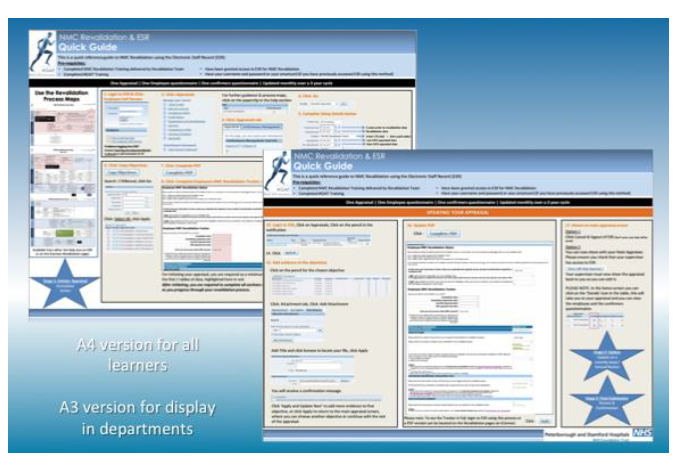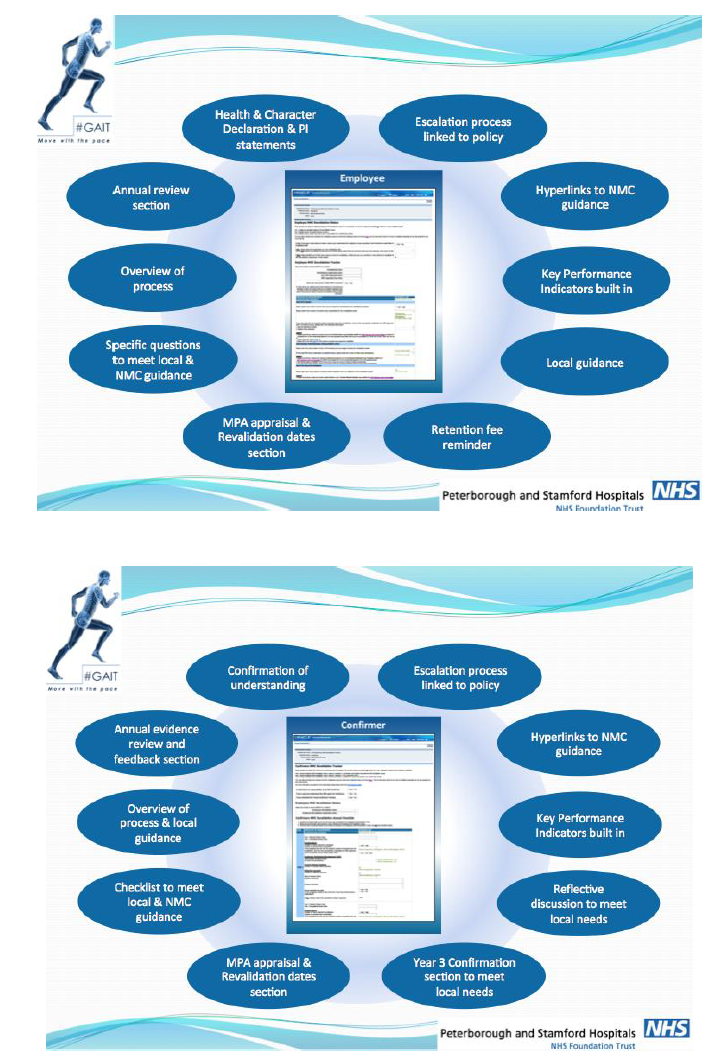Background
Peterborough and Stamford Hospitals NHS Foundation Trust was formed on 1 April 2004 as one of the first 10 foundation trusts created under the NHS Act 2003, and is the successor organisation to Peterborough Hospitals NHS Trust.The Trust rolled out ESR HR and payroll functionality in September 2006, and then expanded its use through the implementation of Oracle Learning Management (OLM) in 2011, followed by Career Management in 2013 - this is when we started to visualise ESR as a complete solution rather than stand-alone functions.
Our first step on the self-service ladder came with the introduction of e-learning trust-wide and with the piloting of employee self-service (Limited Access); these were well received by staff, which stimulated a desire for more development and exploration of the ESR self-service functionality.
The Trust is now on a journey of ESR discovery and workforce system transformation, currently implementing phase 2 of our strategy, introducing the appraisal module within ESR self-service for NMC Revalidation.
The Project
Peterborough and Stamford Hospitals NHS Foundation Trust employs 2,690 nurses and midwives. To ensure we sustain a high level of care we must ensure our staff feel supported both in their delivery of care and professionally in their roles. This was of upmost importance and at the forefront of our minds when the Nursing and Midwifery Council (NMC) launched its new guidance on Nurse Revalidation.A Project Manager was appointed, who undertook initial scoping of the project, and for quality assurance and engagement purposes established a NMC Revalidation Steering group chaired by the Chief Nurse, with senior nursing and midwifery representative across the trust.
In order to understand our responsibility as an employer we identified 3 key priorities:
• Environment & Resources
Provide a supportive environment and sufficient resources to ensure staff successfully revalidate.
• Governance
Provide a clear governance structure to individuals, the trust, and relevant professional bodies and the NMC
• Risk Aversion – Reporting Compliance
To provide a robust reporting suite to manage revalidation progress against KPI’s, thus the risk to the Trust
The solution and its delivery clearly had to meet all of these priorities, to provide the assurance to the trust that staff would be fully supported to revalidate successfully, minimising the risk to patient care. It was evident that the chosen system was instrumental in meeting these priorities; a full IT options appraisal was undertaken to evaluate a number of the revalidation systems in the market place, ESR being one of them. Through this process ESR self-service and its appraisal module was selected as the chosen system. The external third party systems all delivered a basic revalidation solution, but were all let down by cost and data maintenance. ESR not only met all the requirements at no direct cost and no additional maintenance but has the added advantage of all the additional self-service functions, which could release further efficiency to the trust and independence to our staff.
Nicola Fowler, HR Transformation Programme Manager and ESR Lead explains: “The newway of working involving a self-service approach is required whether trusts use ESR or an alternative system. The key difference is by choosing ESR; trusts already have access to the workforce system with an established infrastructure for maintenance, and in addition receive the greater self-service functionality. This empowers staff and enables the trust to streamline processes to gain further efficiencies in back office functions. It also places trusts in a favourable position for any new capability being made available in ESR in the future.”
The NHS ESR Central Team (NECT) proposed a solution to the National Special Interest group in September 2015, which highlighted how the ESR solution could be used to deliver this agenda. We adopted, and highly tailored this solution to meet the needs of our trust and launched our solution; #GAIT in April 2016, coinciding with the new NMC guidelines.
• Get connected to ESR
• Take Action
• Following Instructions
• Timely Progress
Working collaboratively with NECT and our regional NHS ESR Account Manager, we developed the localised tailored format; #GAIT. This version means employees are able to access ESR self-service to record all progress against the NMC requirements, attach supporting evidence and transfer the information to their Confirmer. Confirmers are able to access ESR self-service via Supervisor self-service (Limited Access) to review an employee’s progress and record their checking processes. Using ‘Limited Access’ URP for supervisors negated the need for smartcard access.
The information recorded is available via the Business Intelligence (BI) reporting tool at manager and trust level. A primary advantage of selecting ESR is employees and managers (confirmers) not only receive the solution for revalidation, but also have access to the full ESR self-service functionality, which includes access to all personal & post information including payslips, training information and ability to make changes directly in ESR supporting the Trust’s vision to be paper-lite.
The project produced a number of key documents including Revalidation Policy & KPI’s,
ESR Process Maps, Localised ESR Employee and Confirmers/Peer Reviewer Revalidation
Trackers (questionnaires), Revalidation and ESR Implementation Guide and ESR #GAIT Training Materials & Quick Reference Guides. The Trackers (questionnaires) are key to its success; our trackers include detailed revalidation questions with year 1, 2 and 3 evidence logs, and hyperlinks to the NMC website for templates and to the trust revalidation pages on our intranet. Please see graphic (above) how our trackers are different to the national templates.
To aid the learning and development of our staff; staff that were historically not required to use computers on a daily basis, an e-learning package on basic IT skills and a suite of training material was produced including a take-away quick reference guide. These are not only given to staff as they attend their training, poster versions are also displayed in wards areas as a useful reminder and reference tool.

For More Information
We are happy to share all our training material, ESR process maps, HTML for Questionnaires and also the ESR & Revalidation Implementation guide - an essential for ESR professional users.Click here to download the full case study PDF Nurse
Nicola Fowler, HR Transformation Programme Manager - [email protected] Lisa Sharp, Project Manager – Revalidation - [email protected]

